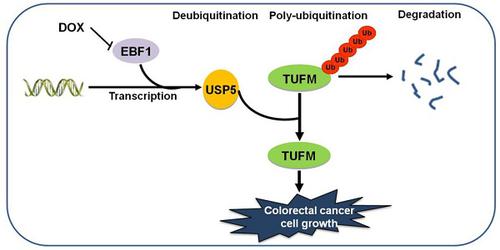当前位置:
X-MOL 学术
›
Theranostics
›
论文详情
Our official English website, www.x-mol.net, welcomes your feedback! (Note: you will need to create a separate account there.)
Ubiquitin specific peptidase 5 regulates colorectal cancer cell growth by stabilizing Tu translation elongation factor.
Theranostics ( IF 12.4 ) Pub Date : 2019-01-01 , DOI: 10.7150/thno.33803 Xin Xu 1 , Aiwen Huang 2 , Ximao Cui 3 , Kunkun Han 4 , Xiaodan Hou 1 , Qun Wang 1 , Long Cui 3 , Yili Yang 1, 5
Theranostics ( IF 12.4 ) Pub Date : 2019-01-01 , DOI: 10.7150/thno.33803 Xin Xu 1 , Aiwen Huang 2 , Ximao Cui 3 , Kunkun Han 4 , Xiaodan Hou 1 , Qun Wang 1 , Long Cui 3 , Yili Yang 1, 5
Affiliation

|
Ubiquitin specific peptidase 5 (USP5) is a ubiquitous expressed deubiquitinating enzyme (DUB). It has been shown involved in DNA repair, apoptosis, inflammation, and tumor cell growth. However, the function and molecular mechanism of USP5 in colorectal cancer (CRC) are still unclear. In the present study, we asked how it affected the growth of colorectal cancer cells. Methods: A shRNA-based high-content screening was performed to identify DUBs affecting the growth of CRC cells. CCK-8 assay and xenografts were used to assess CRC cell growth, survival and tumorigenesis. RT-qPCR, immunoblotting and immunohistochemistry were carried out to quantitate USP5 expression in CRC tissues and cell lines. Immunoprecipitation and mass spectrometry analysis were performed to identify USP5-interacting proteins. Cycloheximide chase was performed to assess Tu translation elongation factor (TUFM) stability. Dual luciferase reporter assay was utilized for USP5 promoter analysis. Results: We found that USP5 was highly expressed in a group of primary CRC tissues, and the increased USP5 was correlated with clinical stages and shorter overall survival. While USP5 knockdown effectively inhibited CRC cell growth, overexpressed USP5 promoted the growth of CRC cells and made them more resistant to doxorubicin (DOX). TUFM was discovered as a substrate of USP5. USP5 deubiquitinated TUFM and increased its level in CRC cells. Enforced expression of TUFM was able to alleviate the growth inhibition induced by USP5 knockdown. Further analyses showed that EBF transcription factor 1 (EBF1) was a major regulator for USP5 transcription, and DOX inhibited EBF1-USP5-TUFM axis in CRC cells. Conclusions: USP5 was required for CRC cells and promoted their growth and resistance to chemotherapeutics. TUFM was a USP5 deubiquitinating substrate that mediated the cellular effects of USP5. The transcription of USP5 was regulated by EBF1. Thus, targeting EBF1-USP5-TUFM axis is a potential novel strategy for CRC treatment.
中文翻译:

泛素特异性肽酶5通过稳定Tu翻译延伸因子来调节结直肠癌细胞的生长。
泛素特异性肽酶5(USP5)是一种普遍表达的去泛素化酶(DUB)。已经显示出它与DNA修复,细胞凋亡,炎症和肿瘤细胞生长有关。但是,USP5在结直肠癌(CRC)中的功能和分子机制仍不清楚。在本研究中,我们询问了它如何影响结直肠癌细胞的生长。方法:基于shRNA的高含量筛选用于鉴定影响CRC细胞生长的DUB。CCK-8测定法和异种移植物用于评估CRC细胞的生长,存活和肿瘤发生。进行RT-qPCR,免疫印迹和免疫组织化学以定量USP5在CRC组织和细胞系中的表达。进行了免疫沉淀和质谱分析,以鉴定与USP5相互作用的蛋白质。进行环己二酰亚胺追踪以评估Tu翻译延伸因子(TUFM)的稳定性。双重萤光素酶报告基因测定用于USP5启动子分析。结果:我们发现USP5在一组原发性CRC组织中高表达,并且USP5的增加与临床分期和较短的总生存期相关。虽然USP5敲低可以有效抑制CRC细胞的生长,但过表达的USP5可以促进CRC细胞的生长,并使它们对阿霉素(DOX)的耐药性更高。TUFM被发现是USP5的底物。USP5使TUFM去泛素化并增加其在CRC细胞中的水平。TUFM的增强表达能够减轻USP5敲低诱导的生长抑制。进一步的分析表明,EBF转录因子1(EBF1)是USP5转录的主要调节因子,DOX抑制CRC细胞中的EBF1-USP5-TUFM轴。结论:USP5是CRC细胞所必需的,并能促进其生长和对化疗药物的耐药性。TUFM是介导USP5的细胞效应的USP5去泛素化底物。USP5的转录受EBF1调控。因此,靶向EBF1-USP5-TUFM轴是用于CRC治疗的潜在新策略。
更新日期:2019-01-01
中文翻译:

泛素特异性肽酶5通过稳定Tu翻译延伸因子来调节结直肠癌细胞的生长。
泛素特异性肽酶5(USP5)是一种普遍表达的去泛素化酶(DUB)。已经显示出它与DNA修复,细胞凋亡,炎症和肿瘤细胞生长有关。但是,USP5在结直肠癌(CRC)中的功能和分子机制仍不清楚。在本研究中,我们询问了它如何影响结直肠癌细胞的生长。方法:基于shRNA的高含量筛选用于鉴定影响CRC细胞生长的DUB。CCK-8测定法和异种移植物用于评估CRC细胞的生长,存活和肿瘤发生。进行RT-qPCR,免疫印迹和免疫组织化学以定量USP5在CRC组织和细胞系中的表达。进行了免疫沉淀和质谱分析,以鉴定与USP5相互作用的蛋白质。进行环己二酰亚胺追踪以评估Tu翻译延伸因子(TUFM)的稳定性。双重萤光素酶报告基因测定用于USP5启动子分析。结果:我们发现USP5在一组原发性CRC组织中高表达,并且USP5的增加与临床分期和较短的总生存期相关。虽然USP5敲低可以有效抑制CRC细胞的生长,但过表达的USP5可以促进CRC细胞的生长,并使它们对阿霉素(DOX)的耐药性更高。TUFM被发现是USP5的底物。USP5使TUFM去泛素化并增加其在CRC细胞中的水平。TUFM的增强表达能够减轻USP5敲低诱导的生长抑制。进一步的分析表明,EBF转录因子1(EBF1)是USP5转录的主要调节因子,DOX抑制CRC细胞中的EBF1-USP5-TUFM轴。结论:USP5是CRC细胞所必需的,并能促进其生长和对化疗药物的耐药性。TUFM是介导USP5的细胞效应的USP5去泛素化底物。USP5的转录受EBF1调控。因此,靶向EBF1-USP5-TUFM轴是用于CRC治疗的潜在新策略。



























 京公网安备 11010802027423号
京公网安备 11010802027423号